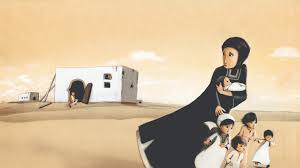Samira left the village of Otaiba in the Damascus countryside after tasting the bitterness of death, shelling and hunger; carrying her small daughter in her arms, and bravely trying to defend her son from harm, she hoped to take them to safety. But when she settled in the town of Achrafieh Sahnaya, she found that the war was not over for her, and that hunger and sorrows persisted, even when the area is safe.
“I live with my parents, my two sisters and their children in one house. Each family lives together in one small room. If it were not for the owner of the house who allowed us to stay there, regardless of the large number of occupants, I dread to imagine what would have become of us,” said Samira. “We left our home in Ghouta after we lost the men in our family. In the midst of war, we could not secure a decent life for our children.”
Samira’s husband was a hardworking farmer. He was arrested in the early days of the revolution and was tortured to death in detention. Samira does not know where his body is.
“After I received the sad news, I was sure that darker days were yet to come, so I was patient and bore the burden alone, trying shelter my children for the horrible situation that we found ourselves in.”
In their temporary home, organisations provided them with assistance, but with everyone sharing one kitchen and one bathroom there is little to no privacy. There was only one heater in the grandparents’ room; the children gathered around it with faded ambition, trying desperately to stay warm and happy. However, the adults could not be patient with the children’s noise and games, which made the three young mothers take their children and lock them in their respective cold rooms.
Samira adds that she tried to leave the house and move, so that her two children could have a new independent life, but she was unable to do so because her job as a house cleaner did not provide her with enough to rent independently.
“The people in Achrafieh are very good,” says Samira, “and I have discovered their generosity over the years that I have lived with them. They respect and have pity on strangers, but the material conditions for most of them are very hard. Even those who asked me to help clean their homes are no now longer able to pay me and stopped hiring me.”
The young widow tried to work as a shop assistant, but the pay was very low, and when business fell away, they were unable to pay their employees. She tried to secure a government job but found that leverage was needed, which she did not have. Still, everyday, she would leave home looking for any job, hoping she would be able to return with a toy for the children or a decent meal.
The young woman adds that she does not care about make-up or standing before a mirror to care for herself. She never dreamed of buying new clothes. She only dreams of having a small independent kitchen and knowing where her husband was buried so she can seek comfort.
An activist, Daniel Rizk, tells Ana Insan that he and other activists tried to find suitable work for Samira, but her lack of education prevented it. Their work focused on securing a status and moral care for the children, and providing some in-kind assistance. The number of the displaced people is huge and “we cannot help all of them,” says Rizk.
Poverty grows every day, and the monster of poverty and sorrow is following everyone. We try to dig great trenches of love so that this monster does not devour us all.
This article was translated and edited by The Syrian Observer. Responsibility for the information and views set out in this article lies entirely with the author.


